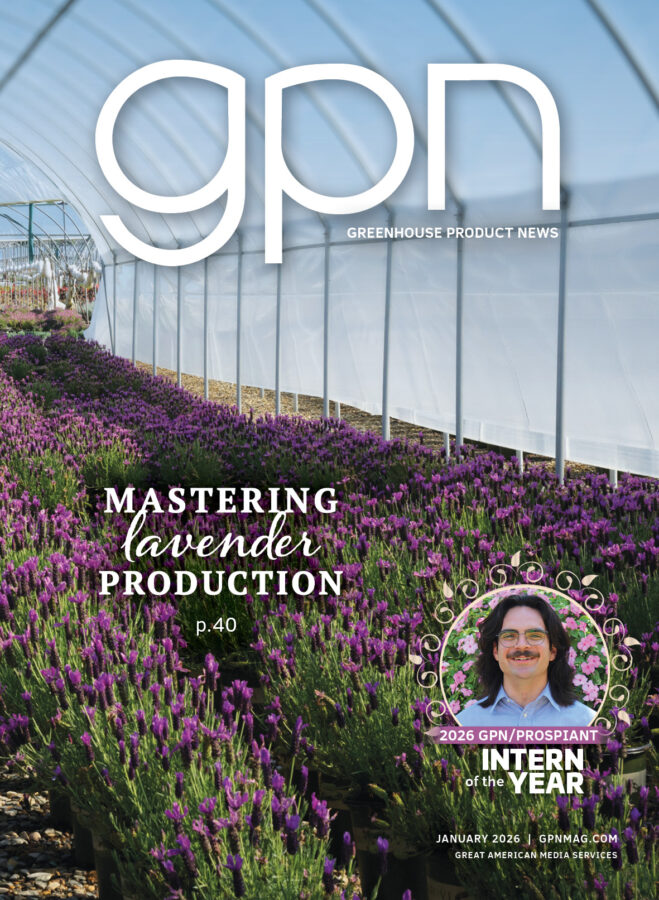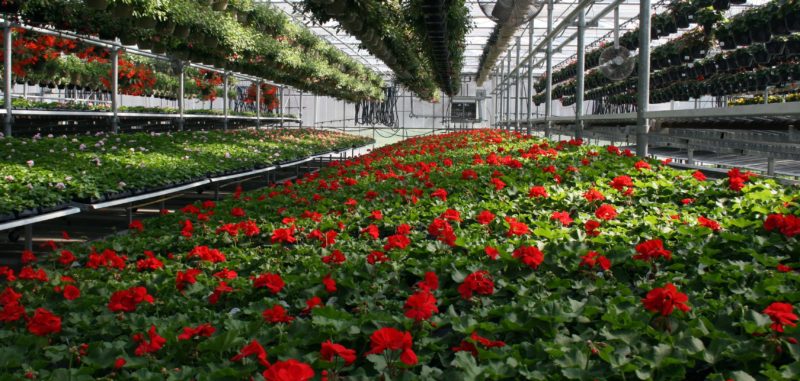
Cover Story — Embracing Opportunity
Dickman Farms at a glance
Year founded: 1903
Location: Auburn, New York
Total growing space: 11 acres
Key personnel: Dave and Jim Dickman, owners; Bob Dickman, greenhouse general manager; Peggy Dickman, office manager; Caroline Blackman, business manager; Doug Mead, head grower; Jill Hutchinson, shipping manager; Kathy Bardwell, key accounts manager; Stephanie Whitehouse, retail general manager; Ryan Westover, facilities manager; Kelly Husby, marketing manager
Number of employees: 50 year-round, 100+ during peak season
Business segments: Young plants, finished plans and retail
Product offering: 1,200 different varieties of vegetative annuals for young plant division and 300 different varieties of annuals for finished plant division
Website: www.dickmanfarms.com
Established in 1903, Dickman Farms is now in its fifth generation of family ownership. Like many family-owned greenhouses today, Dickman Farms’ roots are in traditional crop farming. The Dickman family spent 83 years growing squash and similar farm crops and crossed over to greenhouse crops in the 1980s.
Current owners (and brothers), Dave and Jim Dickman have witnessed and been a part of the century-long transitions of Dickman Farms in Auburn, New York. To be competitive and successful in this market can be a challenge, but they’ve learned to diversify risk.
Today, the company has built 11 acres of production greenhouses along with a 3⁄4-acre retail garden center. The greenhouse business is comprised of two separate divisions for both young and finished plants.
Maintaining success after five generations in business can be overwhelming, but Dave and Jim Dickman do their best to emulate their great grandparents’ mentality, “taking risks and putting them out there,” says Dave.
Rooting History
Dickman Farms’ first major transition occurred in the 1980s, like many other farm operations at the time, when Richard and Dorothy Dickman (Dave and Jim’s parents) began expanding into the greenhouse business, which has now become the current wholesale and retail operation.
Shortly before the transition to ornamentals, Richard established a relationship with Ball Seed as a supplier. As Dave Dickman took on a more prominent role in the business, he says he pitched an idea of a better “balance of trade” relationship to their Ball sales representative, who then brought Dickman Farms on as a supplier of three simple items. And in 1997, Ball asked if they would consider becoming a rooting station. Dave’s response: “What is that?” And the rest is history.
The company’s young plant business now makes up about 42 percent of Dickman Farms’ total business, with finished plants accounting for 33 percent, retail is 18 percent and trucking is 8 percent. Dave says the company believes in diversification. “I’ve always tried to spread the risk a little bit in lots of different ways.”
Recognizing Opportunities
As many growers know, establishing and maintaining a prosperous relationship with retail customers has its challenges. A grower is only as successful as its customer. And Dickman Farms has managed to recognize potential in the customers it services today.
Aside from its 50 independent garden center customers, Dickman Farms also services two large regional chains: Meadows Farms and Wegmans Food Markets.
“When we converted from farming to greenhouses, I knew we needed to grow the greenhouse sales pretty quickly,” shares Dave. He says his father was traveling to Virginia for a wedding at the time and happened to drive past the headquarters for Meadows Farms, a multi-store chain throughout Maryland and Virginia.
Richard introduced himself and dropped a card off. The buyer called up the farm, and “we started doing a little bit of business with them on mums,” says Dave. “And the next year on annuals. Next thing you know, we were shipping six or seven tractor-trailers a week.”
Another huge opportunity came about six years ago with the addition of Wegmans Food Markets, a high-end family-owned grocery chain based in New York. In the fall of 2010, Dickman Farms received a phone call from Wegman’s. They were in need of 60 mums delivered to their Ithaca store the next morning. Dave’s immediate response was that they were unable to fulfill the order, as they had already shipped to that area for the week and the order didn’t meet the minimum requirement. But he stopped himself and instead proposed a deal.
“I said, you know what, I’m going to have your 60 mums in front of your store tomorrow morning at 8 a.m.,” says Dave. “But if I do that for you, you have to promise to come up here next week and tour my facility and talk about doing more business with us. And he did.”
Dickman Farms started with 60 mums in 2010 and has grown the Wegman’s business to more than 100 tractor-trailers for spring 2017.
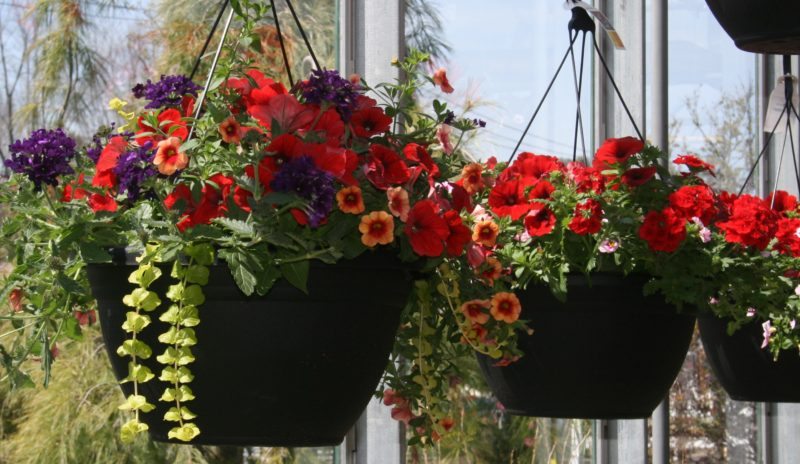
Shift From Gardener to Decorator
Having Wegmans join Dickman Farms customer base tackled one of the company’s biggest challenges, the seasonality of the industry.
“We have seen it in our young plant division as well as our spring season,” says Bob Dickman, Jim’s son and greenhouse general manager. “A lot of our growth has come within the two peak seasons of young plants and finished bedding plants and our team is focused on shoulder season sales opportunities.”
Dickman Farms saw an opportunity in shoulder season sales due to a recent shift from the home gardener to the home decorator.
According to Bob, Dickman Farms’ product mix has evolved from growing seed- sown plugs into plants to more vegetative annual mixes into large finished containers.
Dave says, “We need to be in the business of selling plants to people who are selling plants in the shoulder season. And that’s not necessarily a garden center setting. The people that are going to the grocery store every single week, picking up their weekly decorative product … that is truly how we are growing our shoulder season.”
Growth of Retail
Understanding the needs of its retail customers comes fairly easy to the staff at Dickman Farms, and that’s largely due to the success of its own retail operation.
According to Stephanie Whitehouse, retail general manager, Dickman Farms has been selling its plants to the public since 1979. “Today our garden center generates 18 percent of our total annual sales for the company,” she says. “Over the years, it evolved from a small retail operation outside of one greenhouse to one of the top 100 retail operations in the United States.”
One of the biggest advantages of operating a greenhouse and retail business side by side is the ability to trial potential varieties to add to the operation’s finished production.
“We are always looking at new plant varieties here at Dickman Farms,” shares Kathy Bardwell, key accounts manager. She says they regularly attend events and trade shows, such as California Spring Trials and Cultivate in Columbus, Ohio, and also visit trial gardens around the country.
“Our best trialing results for customer interest for new plant varieties comes directly through our retail garden center,” Kathy says.
Dave adds, “It does give us an idea of what works and what doesn’t, which we’re then able to share with our other IGC customers.”
As many shifts in the gardening consumer category continue, Dave says they are looking to “put the ‘farm’ back into Dickman Farms.” They are looking at different products to fulfill this niche, such as adding cut flowers that consumersttwt cut on their own. They have also gone back to growing their own pumpkins.
“We still have a few hundred acres of farmland that we own,” says Dave. “We’ve been renting it out, but we’re looking at putting in rye straw and making some mini bales for retail and wholesale to our garden center customers.
According to Dave, the retail business will continue to grow and expand by setting very aggressive goals. “We’re planning to grow our retail sales by 50 percent across the next three years.”
This naturally seems to be the next logical step for the business as their biggest independent garden center customer is their very own garden center. As Dave professes, “You’re only as good as the current buyer.”
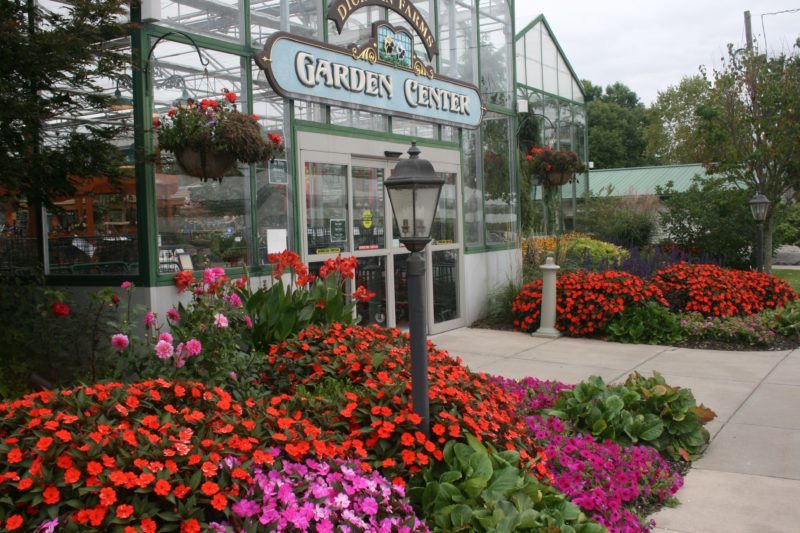
by 50 percent across the next three years.
A Play On History
Dickman Farms has taken different entrepreneurial paths over the years, and from 1932 to 1961, a very popular big band nightclub called “Club Dickman” operated in the current glass greenhouse location. Crowds from across the region would enjoy the nightclub on Friday and Saturday nights.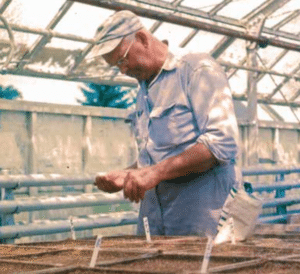
While the nightclub has since closed its doors, Club Dickman has been revitalized through the garden center business.
“In 2006, we introduced Club Dickman as an online gardening club, which introduced members to new arrivals and provided our Smart Gardening Tips series with special shopping events,” says Stephanie Whitehouse.
And the program has grown exponentially over the past decade. “Over the course of time, it has grown to over 5,500 members that receive our weekly e-newsletter,” Whitehouse says.
“The next phase of Club Dickman will transform its membership benefits into a three-tiered loyalty program that will be unveiled in spring 2017.”
Modern Machinery
According to Jim Dickman, Dickman Farms has been busy building over the last 15 years. “We have torn down and rebuilt 11 acres of greenhouses,” he says. “The greenhouse structure is Westbrook gutter vented and more recently we have shifted to an open-roof design.”
In addition to the structure upgrades, Dickman Farms utilizes modern technology through its boom irrigation system, hot water floor heat, HID lights, high-efficiency boilers, heat retention curtains, Priva environmental controls and more.
Dickman Farms latest development is its Visser Autostix machine for sticking cuttings.
“We actually had the first one in the U.S. set up in November,” shares Dave Dickman. “Right now, there are five total in the country.”
The new machine is still in beta testing mode, but Jim says the system seems very promising.
“We’re going to do probably 11 or 12 million cuttings this year, and we’ll probably do a million through that machine,” adds Dave.
Young Leadership
Did you know that three Dickman Farms employees have been recognized in GPN’s 40 Under 40 program? Bob Dickman, greenhouse general manager; Ryan Westover, facilities manager; Stephanie Whitehouse, retail general manager; and Doug Mead, who recently was awarded Young Grower of the Yea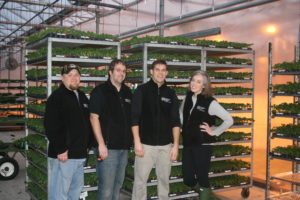 r are proving that young leadership is strong at Dickman Farms.
r are proving that young leadership is strong at Dickman Farms.
“Dickman Farms is all about people, plants and community,” says Dave Dickman. “We seek team members with outstanding talents and then give them the tools and opportunities that allow them to lead us in this industry.”
Jasmina Dolce is managing editor of GPN magazine. She can be reached at jdolce@greatamericanpublish.com.








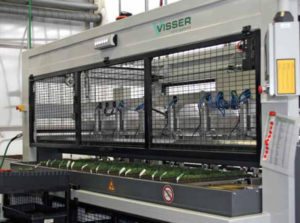
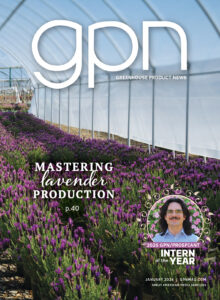
 Video Library
Video Library 

















